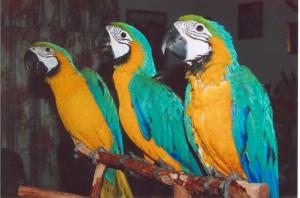
Tasha, having known you since infancy, I have always admired your innate interest in nature and the things that God made. Please tell us about that interest and how it was developed in your life.
I have always been very in tune to nature and all of the things God created. When I was little I would go up to any animal I could, whether that was a turtle, frog, goat, anything in the norm, and out of it too. I was never fearful of any animal that I happened across. While I was growing up, my family was very involved in nature activities. We would go on nature walks, visit farms, and zoos. We enjoyed all that God has created for us. It was something that my mother and my grandparents encouraged in me and helped me with. I remember when I was little I would cry when even a bug got killed. To this day, I still try to catch the bugs that make their way inside to release them back outside.
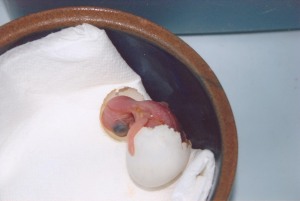
Is there one part of nature study that you have taken on as your specialty? What is it? How did it start?
I wouldn’t say I have one area of nature that is my specialty. I love everything to do with nature! However, I do try to help out any animals that need extra assistance. I have rescued cats, frogs, baby possums, birds, lizards, baby raccoons, and many more creatures. Some I have kept until they were ready to be released back into the wild and others I found a more suitable home for because they had extra issues they were dealing with. It’s almost like I have a calling card out there that says that any animal, stray or injured, knows where they can come to find help and a haven.
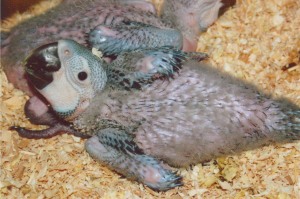
I know that you have worked extensively with exotic birds. Please tell us about your experience in raising them.
I started working at a bird store during my teen years. It seemed to be a perfect fit for me, because I got to be around animals all day long. I started out as just a grub worker, cleaning cages and doing the dirty work, which I never minded. I enjoyed making things better for the birds. In just doing that, I developed bonds with them. It wasn’t too long though, before the owner of the store saw this connection and wanted me to try working with the babies. At that point I started hand feeding and taking the babies who fed through the night home with me. At one point I had over 50 babies at my house, not to mention all the ones at the store as well. I had a connection with each and every one of them. I started working with the vet and ended up giving shots and helping with all of their other medical needs too, including sitting in and helping with surgeries. I have raised every kind of exotic bird, from parakeets all the way up to a hyacinth macaw (which is the largest of all exotic birds). In addition, I have raised many from the egg or just one day old up, because the parents refused to take care of them. In a sense I became mama bird to all of the babies.
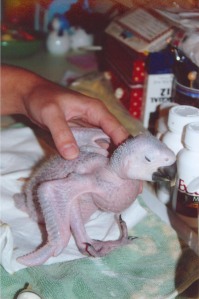
Raising each bird is unique, depending on the age and species of birds. Some of the main issues involved in raising and caring for baby birds are: making sure they have clean and dry bedding when they are really small and then clean cages when they are bigger; hourly feeding depending on the age; and giving each and everyone the tender loving care that makes an affectionate, loving and gentle bird. It is also important to make sure they stay clean, with no formula or waste on their skin or feathers. It’s important to keep an eye out for any changes that there might be in their behavior or health, as this could mean there is something wrong with them which might need to be addressed as soon as possible by a vet. There are many other details but those are the most important ones.
After the babies are finished being hand fed, they get new homes. Sometimes people come into the store and buy them before they are grown enough to leave, so the babies stay around until they are ready for their new homes. Hand feeding is a very precise thing and it could be deadly if done wrong. When I worked at the bird shop, I would try to make sure each potential owner knew about the behavior of each type of bird, as some are more energetic, others more loving, etc. This way the customer would know what they were committing to. Also I’d make sure they knew the life expectancy for the bird they were interested in, as some live almost 100 years. I wanted them to know it really was a lifetime commitment. Then I would make sure each potential owner had a connection with the bird they were interested in. If they didn’t have a connection, I tried to direct them to a different bird. It wouldn’t be a good relationship for the bird or owner if there wasn’t a connection. The main thing was to make sure they were going to be a loving person or family who would take really good care of each and everyone. Even though raising baby birds can be fun, it is a lot of work and takes a lot of commitment! There are also many abandoned and abused birds in the world who need loving and caring homes too.
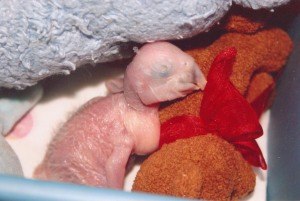
Please share with us where you are in life right now — and what your plans for your future are. Do you see that nature study will be a part of your future? How?
Right now I am going to college, trying my hardest to finish as quickly as I can. I am studying occupational therapy. Even though I am not perusing a career in nature, nature will always be a part of who I am as a person. I may no longer work in the bird store, but I still get calls for advice from them, customers, and even breeders. In addition I still have my own birds that I have adopted along the way.
Thank you, Tasha, for sharing about raising exotic birds and of the importance of nature study in the development of a well-rounded individual. Much success to you as you continue your education. It is always encouraging to hear from successful homeschooled students.

No comments:
Post a Comment